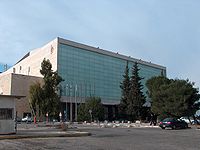Spain in the Eurovision Song Contest 1999
| Eurovision Song Contest 1999 | ||||
|---|---|---|---|---|
| Country | ||||
| National selection | ||||
| Selection process | Internal selection | |||
| Selection date(s) | 10 March 1999 | |||
| Selected entrant | Lydia | |||
| Selected song | "No quiero escuchar" | |||
| Selected songwriter(s) |
| |||
| Finals performance | ||||
| Final result | 23rd, 1 point | |||
| Spain in the Eurovision Song Contest | ||||
| ||||
Spain participated in the Eurovision Song Contest 1999 with the song "No quiero escuchar" written by Adolfo Carmona Zamarreno, Carlos López González, Alejandro Piqueras Ramírez and Fernando Rodríguez Fernández. The song was performed by Lydia, who was selected by Spanish broadcaster Televisión Española (TVE) to represent the nation at the 1999 contest in Jerusalem, Israel. Lydia and "No quiero escuchar" was announced as the Spanish entry on 10 March 1999.
Spain competed in the Eurovision Song Contest which took place on 29 May 1999. Performing during the show in position 3, Spain placed twenty-third (last) out of the 23 participating countries with one point.
Background
Prior to the 1999 contest, Spain had participated in the Eurovision Song Contest thirty-eight times since its first entry in
The Spanish national broadcaster, Televisión Española (TVE), broadcasts the event within Spain and organises the selection process for the nation's entry. In 1998, TVE selected both the artist and song that would compete at the Eurovision Song Contest via an internal selection. The procedure was continued in order to select their 1999 entry.[2]
Before Eurovision
Internal selection
On 10 March 1999, TVE announced that they had internally selected
At Eurovision

The Eurovision Song Contest 1999 took place at the International Convention Center in Jerusalem, Israel, on 29 May 1999. According to the Eurovision rules, the 23-country participant list for the contest was composed of: the previous year's winning country and host nation, the seventeen countries which had obtained the highest average points total over the preceding five contests, and any eligible countries which did not compete in the 1998 contest. Spain was one of the seventeen countries with the most average points and thus was permitted to participate. On 17 November 1998, an allocation draw was held which determined the running order and Spain was set to perform in position 3, following the entry from Belgium and before the entry from Croatia.[7][8] At the contest, Lydia appeared on stage wearing a rainbow coloured dress designed by Ágatha Ruiz de la Prada and Spain finished in twenty-third (last) place with one point.[9][10]
In Spain, the show was broadcast on La Primera with commentary by José Luis Uribarri.[11] The Spanish spokesperson, who announced the results of the Spanish televote during the final, was Hugo de Campos.[12] The broadcast of the contest was watched by 3.95 million viewers in Spain with a market share of 34.2%.[13]
Voting
Below is a breakdown of points awarded to Spain and awarded by Spain in the contest. The nation awarded its 12 points to Croatia in the contest.
|
|
References
- ^ "Spain Country Profile". EBU. Retrieved 12 February 2015.
- ^ "Sistemas de Elección de RTVE para Eurovisión". eurovision-spain.com (in Spanish). Retrieved 2023-11-12.
- ISSN 1134-6582. Retrieved 2023-11-12.
- ^ "TVE y Europa nos han tocado a los españolitos los... "orgullos"". eurofestival.net (in Spanish). Retrieved 2023-11-21.
- ^ "LAS PRESELECCIONES INTERNAS DE TVE". eurovision-spain.com (in Spanish). Retrieved 2023-11-12.
- ^ "Celebramos el cumpleaños de Lydia Rodríguez Fernández, cantautora española y componente de Presuntos Implicados". LH Magazin (in Spanish). 2023-01-15. Retrieved 2023-11-12.
- ^ "Rules of the 44th Eurovision Song Contest, 1999" (PDF). European Broadcasting Union. Archived (PDF) from the original on 25 February 2021. Retrieved 13 March 2021.
- ^ "44th Eurovision Song Contest" (in French and English). European Broadcasting Union. Archived from the original on 7 March 2001. Retrieved 21 May 2023.
- ^ "Final of Jerusalem 1999". European Broadcasting Union. Archived from the original on 12 April 2021. Retrieved 12 April 2021.
- ^ Van Der Merwe, Roy (2023-03-13). "EUROVISION ARTISTS – CUSTUMES THAT GOT ATTENTION – GOOD OR BAD – SPAIN 1999". Retrieved 2023-11-12.
- ^ "Televisión" [Television]. La Vanguardia (in Spanish). 29 May 1999. p. 8. Retrieved 29 November 2022.
- ^ "EUROVISIÓN 1999". Ogae Spain (in Spanish). 2016-07-26. Retrieved 2023-11-12.
- ^ Urrea, Isaac (2016-05-16). "Eurovisión arrasa con 4,3 millones de audiencia pero baja hasta ser el festival menos visto desde 2007". eurovision-spain.com (in Spanish). Retrieved 2023-11-12.
- ^ a b "Results of the Final of Jerusalem 1999". European Broadcasting Union. Archived from the original on 12 April 2021. Retrieved 12 April 2021.
